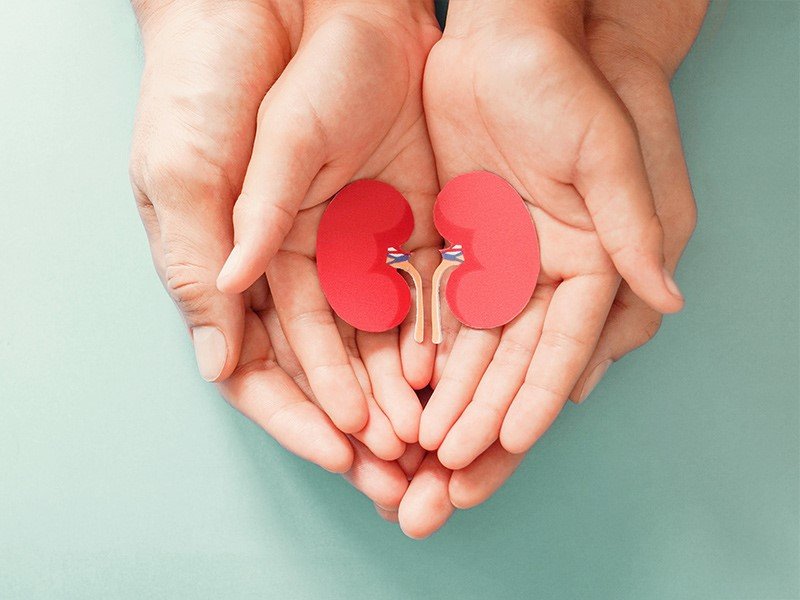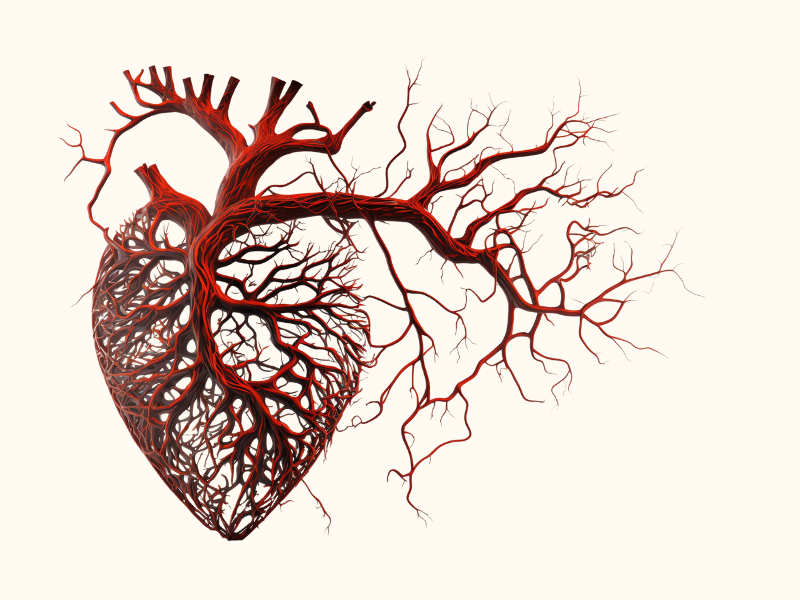04/03/2022
Kidney health — quick facts and nutritional support
Quick facts on why kidney health is important
- Roughly 12% of Europan adults live with some degree of chronic kidney disease (CKD), which oftentimes goes undetected until it reaches an advanced stage.
- Worldwide, an estimated 1 million people die each year from untreated kidney failure. (1)
- The kidneys support many critical functions, including filtering waste products out of the blood, regulating fluids and blood pressure, and forming urine.
- Proper bladder function is crucial in removing toxins and waste from your body completely.
- Kidney health depends on maintaining already-healthy blood pressure and blood sugar levels. These are also important for other health reasons.
Supplements for kidneys & bladder support
Nutrients that promotes kidney health
Vitamin D
- Vitamin D: The kidneys play a role in converting vitamin D to its active form, and kidney disease can lead to vitamin D deficiency.
- Vitamin D may also exert a protective effect on the kidneys. Both clinical and observational studies suggest the active form of vitamin D may improve multiple parameters of kidney function in patients with chronic kidney disease.
CoQ10
- CoQ10: Since the kidneys are high-energy requirement organs like the heart, liver and brain, getting enough CoQ10 can help support kidney health.
- CoQ10 may also benefit kidney health by helping to keep blood pressure levels healthy.
Pyridoxal 5’-Phosphate/B6
- Pyridoxal 5’-Phosphate is a metabolite of pyridoxamine, a form of vitamin B6 that is a potent inhibitor of advanced glycation end product (AGE) formation, which is one of the features of diabetic kidney disease.
- Pyridoxal 5’-Phosphate is shown to support a healthy kidney function nervous system and cardiovascular function, immune and eye health, and more. (2-4)
L-Carnitine
- L-Carnitine: Patients undergoing kidney dialysis can develop a functional carnitine deficiency known as dialysis-related carnitine disorder.
- The National Kidney Foundation recommends treatment of dialysis-related carnitine disorder symptoms with intravenous L-carnitine at 20 mg/kg of total body weight after each dialysis procedure. (5)
Omega-3
- Omega-3 fatty acids from fish oil have been shown to significantly reduce blood pressure (a risk factor for CKD) in several clinical trials on patients with hypertension (6).
- Omega-3 fatty acid supplementation at a dose of 4 g daily reduced blood pressure in patients with CKD in a double-blind trial (7).
- Other evidence has shown that omega-3 fatty acids could reduce proteinuria in patients with CKD, and reduce inflammation and triglycerides in dialysis patients.
- Eating more oily fish with a plant-based diet low in saturated fats may benefit patients who have CKD or those at risk of developing it (8).
- A study of over 3000 individuals showed that among those with greater adherence to a Mediterranean-type diet, greater long-term fish consumption was associated with improved kidney function (9).
Probiotic & Prebiotics
- Probiotics & Prebiotics: Improving the balance of bacteria and microorganisms in the digestive tract has shown promise in preventing formation and assisting removal of uremic toxins from the blood.
- Because these toxins negatively affect kidney function, they are implicated in kidney damage in CKD (10-14).
NAC (N-Acetyl Cysteine)
- N-Acetyl Cysteine (NAC) is a sulfur-containing compound that helps counteract the damaging effects of heavy metal toxicity (Patrick 2006; De la Fuente 2011).
- In animal models, NAC enhanced the renal excretion of chromium and lead, and lowered kidney concentrations of mercury (15).
Magnesium
- Magnesium: High blood pressure can considerably compromise kidney health (16), and magnesium has been shown to reduce blood pressure at intake levels of 500–1000 mg daily (17).
- Moreover, magnesium improves the performance of blood pressure-lowering drugs and may improve the function of the important lining of blood vessels, the endothelium (17,18;19).
- Magnesium deficiency is associated with diabetes and metabolic syndrome, both of which are risk factors for kidney disease (20-25).
- In addition, magnesium-potassium citrate has been studied as a urinary alkalinizer to prevent renal stone formation (26).
Vitamin E
- Vitamin E: Supplementation with vitamin E in combination with pravastatin (Pravachol) and a homocysteine-lowering combination of the B vitamins folic acid B6 and B12 is shown benefitial for kidney health.
- This combination improved measures of cardiovascular health and reduced albumin loss from the kidneys compared with a control group (27).
Curcumin
- Curcumin: The more free curcuminoids the body absorbs, the better.
- Curcuminoid are the compounds in curcumin that can help inhibit inflammation to support joint and vital organ health. (28,29)
Supplements that can support your kidneys
- Kidney Care: Healthy kidney function, drainage, and improved detoxification support
- All products with kidney & bladder supporting ingredients
Read more blog posts
References
- https://www.healio.com/news/nephrology/20180227/1-in-10-people-worldwide-have-ckd-but-many-governm
- Accessed June 6. https://lpi.oregonstate.edu/mic/vitamins/vitamin-B6
- Kidney Int Suppl. 1997;62:S56-9.
- Exp Eye Res. 2019;178:255-262.
- Eknoyan G, Latos DL, Lindberg J, National Kidney Foundation Carnitine Consensus Conference. Practice recommendations for the use of L-carnitine in dialysis-related carnitine disorder. National Kidney Foundation Carnitine Consensus Conference. Am J Kidney Dis. 2003;41(4):868–76.
- Hartweg J, Farmer AJ, Holman RR, and Neil HAW. Meta-analysis of the effects of n-3 polyunsaturated fatty acids on haematological and thrombogenic factors in type 2 diabetes. Diabetologia. 2007;50(2):250–8
- Geleijnse JM, Giltay EJ, Grobbee DE, Donders ART, and Kok FJ. Blood pressure response to fish oil supplementation: metaregression analysis of randomized trials. J. Hypertens. 2002;20(8):1493–9
- Mori TA, Burke V, Puddey I, et al. The effects of [omega]3 fatty acids and coenzyme Q10 on blood pressure and heart rate in chronic kidney disease: a randomized controlled trial. J. Hypertens. 2009;27(9):1863–72
- Huang X, Lindholm B, Stenvinkel P, Carrero JJ. Dietary fat modification in patients with chronic kidney disease: n-3 fatty acids and beyond. Journal of nephrology. Nov-Dec 2013;26(6):960-974.
- Montemurno E, Cosola C, Dalfino G, Daidone G, De Angelis M, Gobbetti M, Gesualdo L. What Would You Like to Eat, Mr CKD Microbiota? A Mediterranean Diet, please! Kidney & blood pressure research. Jul 29 2014;39(2-3):114-123.
- Ramezani A, Raj DS. The gut microbiome, kidney disease, and targeted interventions. Journal of the American Society of Nephrology : JASN. Apr 2014;25(4):657-670.
- Evenepoel P, Meijers BK, Bammens BR, Verbeke K. Uremic toxins originating from colonic microbial metabolism. Kidney international. Supplement. Dec 2009(114):S12-19.
- Vitetta L, Linnane AW, Gobe GC. From the gastrointestinal tract (GIT) to the kidneys: live bacterial cultures (probiotics) mediating reductions of uremic toxin levels via free radical signaling. Toxins. Nov 2013;5(11):2042-2057.
- Vitetta L, Gobe G. Uremia and chronic kidney disease: the role of the gut microflora and therapies with pro- and prebiotics. Molecular nutrition & food research. May 2013;57(5):824-832.
- Samuni Y, Goldstein S, Dean OM, and Berk M. The chemistry and biological activities of N-acetylcysteine. Biochim Biophys Acta. 2013;1830(8):4117–29
- Rasu RS, Crawford T, Manley HJ, Balkrishnan R. Treatment of hypertension and diabetes mellitus in patients with chronic kidney disease: a review. Expert opinion on pharmacotherapy. Oct 2007;8(15):2543-2551.
- Houston M. The role of magnesium in hypertension and cardiovascular disease. Journal of clinical hypertension (Greenwich, Conn.). Nov 2011;13(11):843-847.
- Barbagallo M, Dominguez LJ, Galioto A, Pineo A, Belvedere M. Oral magnesium supplementation improves vascular function in elderly diabetic patients. Magnesium research : official organ of the International Society for the Development of Research on Magnesium. Sep 2010;23(3):131-137.
- Kisters K. Oral magnesium supplementation improves borderline hypertension. Magnesium research : official organ of the International Society for the Development of Research on Magnesium. Mar 2011;24(1):17; author reply 18.
- Kurella M, Lo JC, Chertow GM. Metabolic syndrome and the risk for chronic kidney disease among nondiabetic adults. Journal of the American Society of Nephrology : JASN. Jul 2005;16(7):2134-2140.
- Kabir MS, Dutta PK, Islam MN, Hasan MJ, Mondol G. Prevalence of risk factors of chronic kidney disease in adults. Mymensingh medical journal : MMJ. Oct 2012;21(4):605-610.
- Chaudhary DP, Sharma R, Bansal DD. Implications of magnesium deficiency in type 2 diabetes: a review. Biological trace element research. May 2010;134(2):119-129.
- Munekage E, Takezaki Y, Hanazaki K. [Shortage and metabolic disturbance of magnesium in diabetic patients and significance of magnesium replacement therapy]. Clinical calcium. Aug 2012;22(8):1235-1242.
- Dong JY, Xun P, He K, Qin LQ. Magnesium intake and risk of type 2 diabetes: meta-analysis of prospective cohort studies. Diabetes care. Sep 2011;34(9):2116-2122.
- Yuzbashian E, Asghari G, Mirmiran P, Hosseini FS, Azizi F. Associations of dietary macronutrients with glomerular filtration rate and kidney dysfunction: Tehran lipid and glucose study. Journal of nephrology. Jun 5 2014.
- Jaipakdee S, Prasongwatana V, Premgamone A, Reungjui S, Tosukhowong P, Tungsanga K, . . . Sriboonlue P. The effects of potassium and magnesium supplementations on urinary risk factors of renal stone patients. Journal of the Medical Association of Thailand = Chotmaihet thangphaet. Mar 2004;87(3):255-263.
- Veringa SJE, Nanayakkara PWB, van Ittersum FJ. Effect of a treatment strategy consisting of pravastatin, vitamin E, and homocysteine lowering on arterial compliance and distensibility in patients with mild-to-moderate chronic kidney disease. Clin. Nephrol. 2012;78(4):263–72
- J Altern Complement Med. 2003;9(1):161-8.
- Adv Biomed Res. 2018;7:38.






